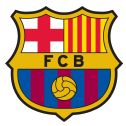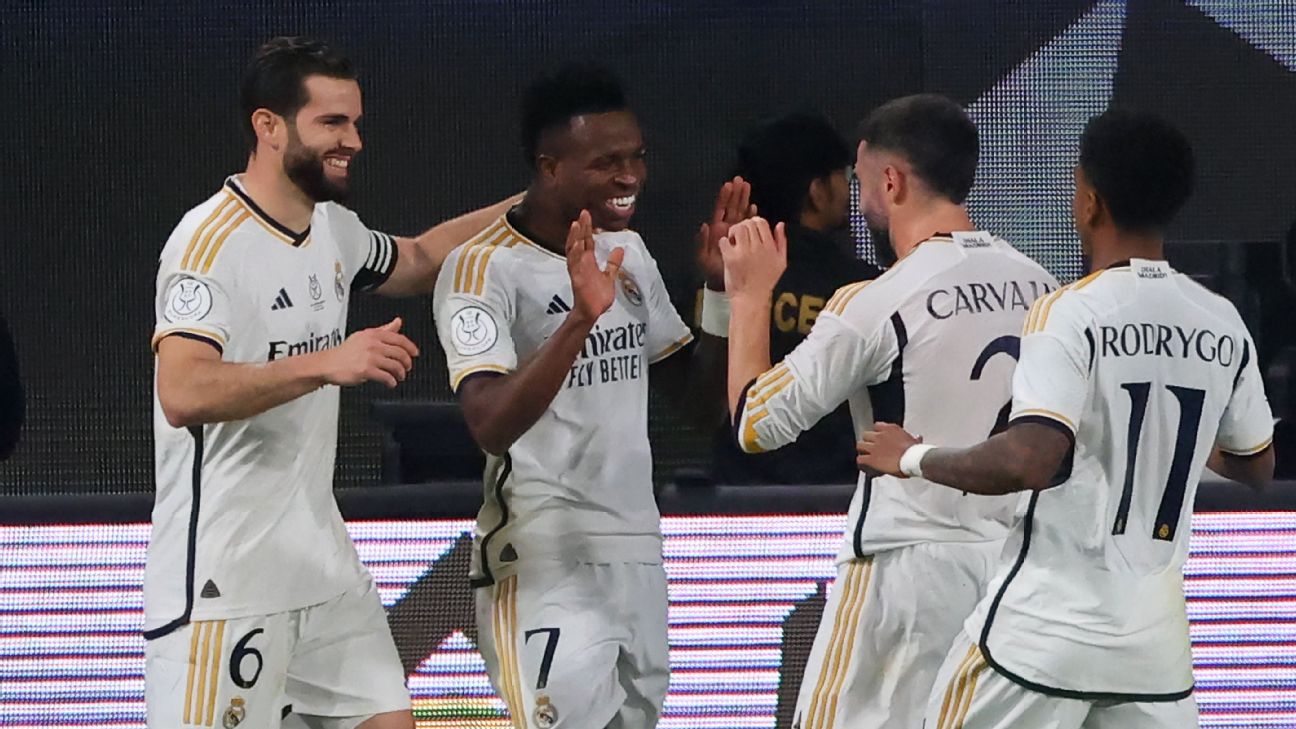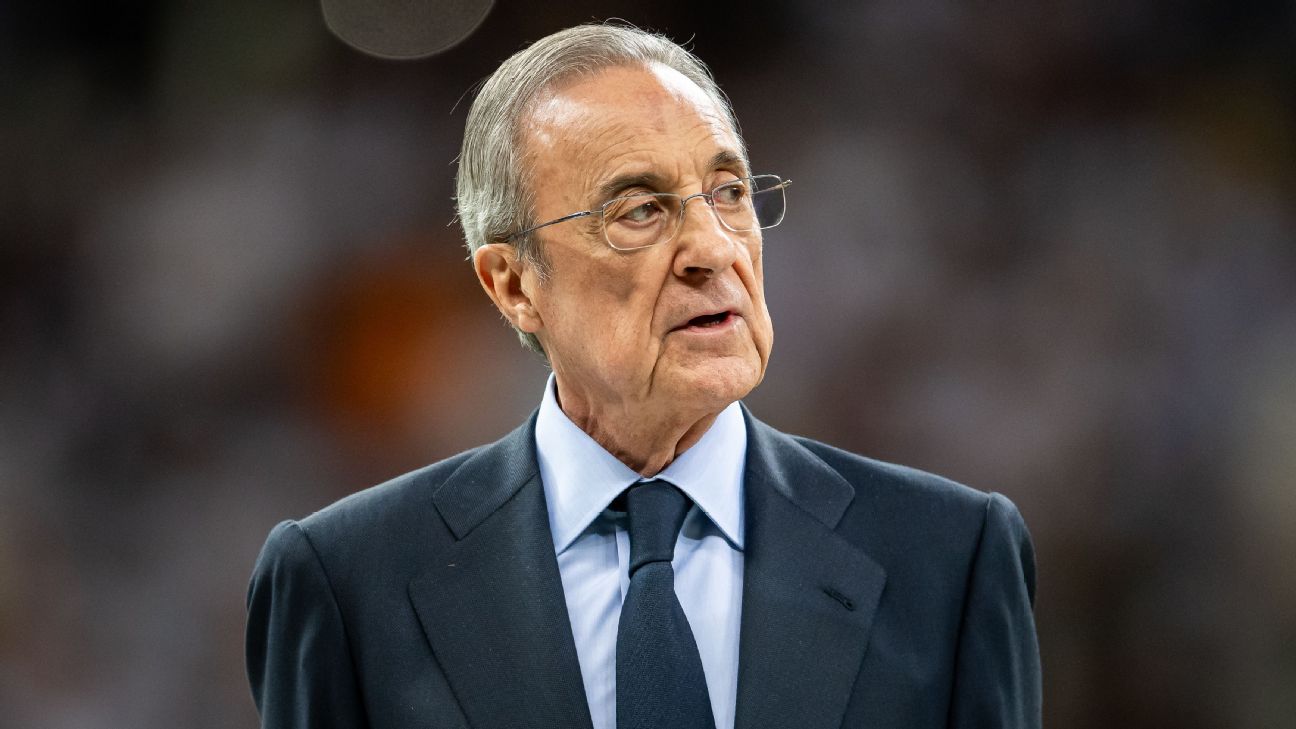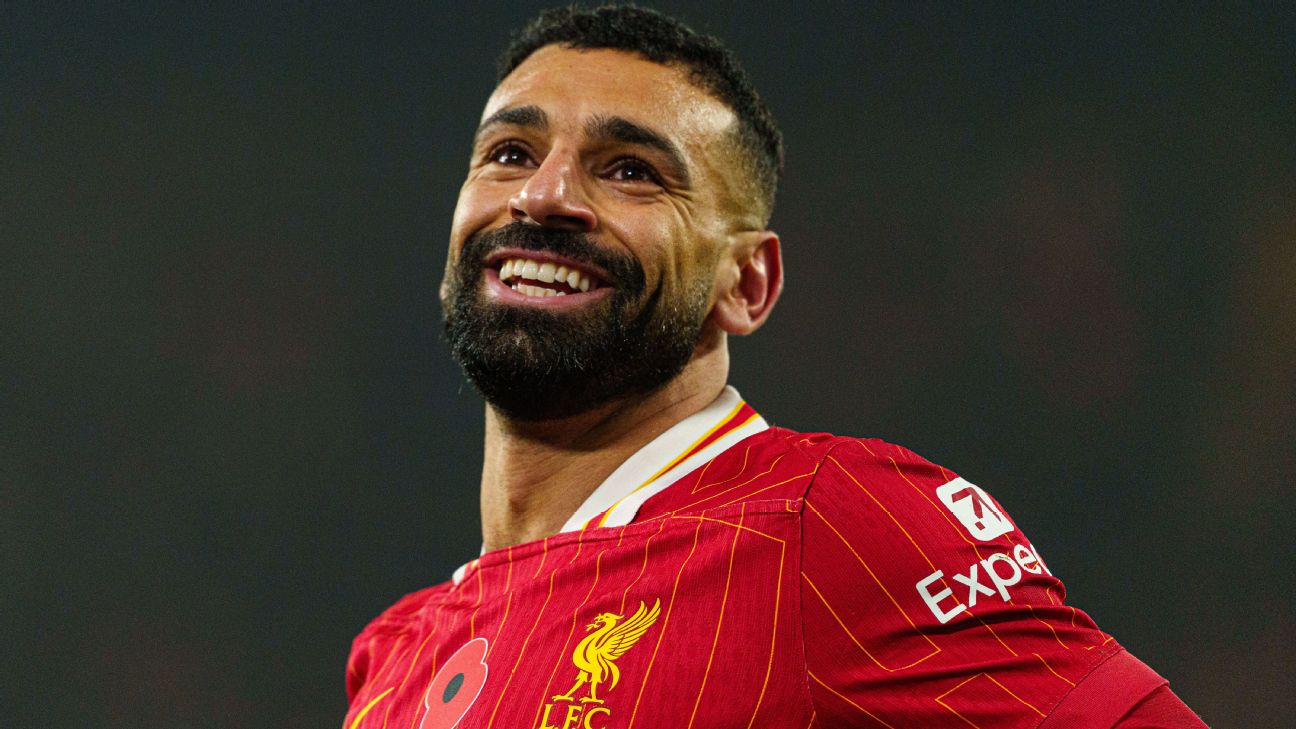Sunday’s Clasico between Real Madrid and Barcelona in the Spanish Supercopa final offered the potential for high drama, but Carlo Ancelotti’s side romped to a 4-1 win over their rivals that will give Xavi & Co. even more headaches to contend with over the remainder of the season.
– Stream Supercopa final replay on ESPN+: Barca vs. Real Madrid
Vinícius scored a first-half hat trick — one of the fastest in the history of this rivalry — as Barcelona struggled to cope with Real’s pace, and even though Robert Lewandowski scored with a fine strike from the edge of the box to give Barca a chance, a late red card for Ronald Araújo compounded the Blaugrana’s issues and ensured a tough trip back to Spain.
(Editor’s note: Alex Kirkland and Sam Marsden break down the major takeaway for both teams.)
 Real Madrid: Vinicius Junior finally makes some noise after quiet season
Real Madrid: Vinicius Junior finally makes some noise after quiet season
It’s been a strange season for Vinícius Júnior, overshadowed by Real Madrid’s latest star, Jude Bellingham, and dealing — for the first time in his career — with injuries that have kept him out of action for a total of two-and-a-half months. There was no ignoring him in Riyadh on Sunday, though, as a 39-minute, first-half hat trick — the third-fastest ever scored by a Real Madrid player in El Clásico — set Madrid on a path to certain victory.
Vinicius’ greatest weapon is his pace, and he forms a high-speed, lethally mobile front two with Rodrygo Goes, ideally suited to exploiting a high defensive line like Barcelona’s. His finishing has improved dramatically too, a quality perfectly showcased by Madrid’s opening goal in the seventh minute. Bellingham’s clever through-ball — spotting that defender Andreas Christensen had stepped up to close him down, leaving space behind — still left Vinicius with a lot to do, but he made it look easy, rounding goalkeeper Iñaki Peña before a straightforward, cool finish from an angle.
His second goal just three minutes later wasn’t quite as elegant, sliding in to bundle Rodrygo’s cross into the net, but his third, from the penalty spot on 39 minutes, was another convincing finish. Rodrygo, Joselu and Luka Modric have all missed penalties this season — and so did Vinicius in pre-season last summer — but this time there was no mistake, Vinicius stuttering his run-up before shooting hard and low into the corner.
The Brazilian star was key to Madrid’s fourth, his cross intercepted by Jules Koundé and rebounding for Rodrygo to finish, and he was the recipient of Ronald Araujo’s red card challenge with 20 minutes left, too. In each of the game’s major incidents, Vinicius was involved.
His numbers so far this campaign have been unremarkable, at least for him — four goals in 11 LaLiga appearances, and two goals in three Champions League starts — though this wasn’t his first great performance this season. Vinicius was impressive in Madrid’s 3-0 Champions League group stage win over Braga on Nov. 8, and outstanding in scoring twice in their 5-1 victory over Valencia three days later. But this was a final, and a Clásico, in a high profile tournament that marks the season’s halfway point, when the serious business begins.
He was substituted on 82 minutes, job done, the first trophy of the season secured, and with more challenges — a Copa del Rey Madrid Derby this Thursday, the Champions League knockout stage, and beating Girona to the LaLiga title — on the way. A fit, scoring Vinicius is good news for Madrid and bad news for any opponent who stands in their way. — Alex Kirkland
 Barcelona: Xavi & Co. must fight to rediscover club’s high standards
Barcelona: Xavi & Co. must fight to rediscover club’s high standards
Barça coach Xavi Hernández has fought against criticism this week, even claiming his side are playing better football this season than last year, when they won the title by 10 points, but his arguments are increasingly based on the past.
Speaking before the final, Xavi promised Barça would dominate Madrid by being loyal to the principles instilled by Johan Cruyff 30 years ago. He used last year’s final, when Barça battered Madrid 3-1, as grounds for optimism. He even returned to a midfield four in Riyadh, the formation responsible for that result, but the personnel were not as good — Iñaki Peña, Sergi Roberto, Ilkay Gündogan and Ferran Torres replaced Marc-André ter Stegen, Sergio Busquets, Gavi and Ousmane Dembélé in respect to last year’s XI — and the team’s flaws were ruthlessly ripped apart.
The truth is that Barça’s standards have dropped after winning the league last May — they lost three of their last four games after winning the title — and they’ve struggled to recover them ever since. That is not just based on one Clásico whooping in the Middle East, but on their body of work over several months. Losses to Madrid and Girona in LaLiga have seen them slip eight points off the pace in the league, while Champions League defeats to Shakhtar Donetsk and Antwerp further highlighted their problems, even though they did not impact their progress to the last-16.
Slow starts to games have been a particular problem and Madrid, presumably having done their homework, flew out of the blocks at Al-Awwal Park, with two goals conceded in 10 minutes telling the story of Barça’s campaign. Granada scored against them after 17 seconds, Alaves after 18 and Antwerp after 75. They also had to come from behind to beat Mallorca, Las Palmas, Celta Vigo and Rayo Vallecano, who each opened the scoring in the eighth, 12th, 19th, and 39th minutes respectively. Girona also edged ahead at Montjuic last month in the 12th minute, but on that occasion, Barça did not come back.
Before the 2-0 Supercopa semifinal win over Osasuna on Thursday, the Blaugrana had also gone 20 games without winning by more than one goal, so the signs were there that this was not a team in full flow. There are, of course, other factors, like the absence of Ter Stegen, João Cancelo, Gavi and Raphinha through injury, but Madrid were also missing key players, especially at the back, and did not seem even half as affected.
Barça’s poorly judged high line gifted Madrid their first two goals. They then took over the ball, but aside from Lewandowski’s brilliant strike, it felt like Madrid were happy to let them have it and wait for a chance to counter. There were other moments, often created Pedri, but the chances fell to Torres, who lacked any killer instinct. A bad night was rounded off with a red card for Ronald Araujo, who also gave away the penalty, for a second booking.
It will not be easy for Xavi to brush off the nature of this Clásico defeat. He credited last year’s success in the competition as the catalyst for winning LaLiga. Barça are still alive in three other competitions — LaLiga, the Champions League and the Copa del Rey — but if things don’t improve quickly, this loss may be looked back on as the catalyst for something entirely different in the coming months with his position under constant scrutiny. — Sam Marsden



